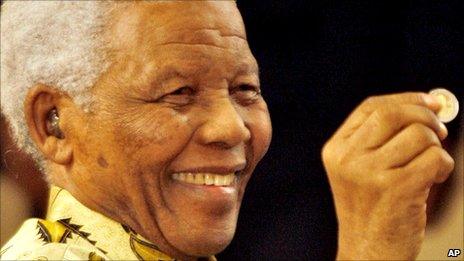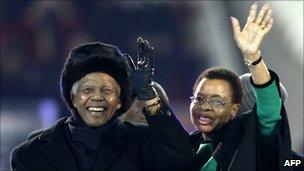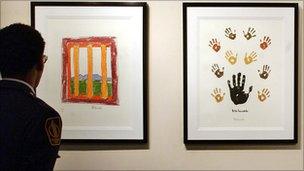The battle for Nelson Mandela's legacy
- Published

The Mandela name is worth millions
While South Africa's political icon Nelson Mandela is set to celebrate his 92nd birthday on Sunday, his relatives and colleagues are becoming increasingly involved in bitter feuds for control of his name because of the political and economic riches it carries.
The disputes are taking place at different levels, involving Mr Mandela's family from his three marriages, the ruling African National Congress (ANC) to which he dedicated most of his life, the various foundations and charities he set up after his retirement in 1999, as well as political comrades and business associates with whom he forged relations over many years.

Mr Mandela's World Cup appearance caused a row
"It's nasty. People are fighting while he is still alive," says the South African author and newspaper columnist Fred Khumalo.
The most recent controversy was over Mr Mandela's appearance at the football World Cup.
In the build-up to the tournament, the ANC government's Sports Minister, Makhenkesi Stofile, and Mr Mandela's grandson, Mandla Mandela, both claimed to speak on behalf of the former president, and gave contradictory accounts of his wishes.
Mr Stofile said Mr Mandela had "demanded" to appear at the opening, while Mandla said he had indicated he would "prefer to be at home".
And Winnie Madikizela-Mandela, the anti-apartheid icon's second wife who he divorced after his release from jail, entered the fray at a pre-World Cup rally in Johannesburg.
Claiming to carry a message on behalf of "Tata" [father], she told the crowd that he wanted the trophy to stay in Africa, indicating the extent to which she was prepared to associate herself with his name, despite the acrimonious personal and political fallout they had at the time of their divorce.
In the end, Mr Mandela did not attend the opening ceremony because of the death of his great-grandchild in a car accident, but was there - according to the Nelson Mandela Foundation which is officially in charge of his itinerary - "in spirit".
Mr Mandela appeared briefly at the closing ceremony, with his current wife, Graca Machel, helping him raise his hand to wave at the crowd - a clear sign of how frail he has become.
Hinting that the issue had again ignited controversy, Mandla said Mr Mandela had attended under "extreme pressure", putting the blame on the world football governing body Fifa.
'In the blood'
It echoed the dispute over Mr Mandela's role in last year's hard-fought general election.
The Nelson Mandela Foundation ruled out Mr Mandela taking part in the campaign, but lost the battle when he attended the final ANC rally to give his backing to the party's controversial presidential candidate, Jacob Zuma.
Taking a swipe at the foundation at the time, Mandla said: "As a family, we are united in that the legacy of Madiba [Mandela] belongs to his family first and to the ANC."
New to the political stage, Mandla has become influential since his appointment as a traditional chief in Mr Mandela's birthplace, the village of Mvezo, and his elevation to parliament in last year's election.
"In my veins runs the blood of the Mandelas which has been around for centuries," he once boasted.
Mr Khumalo has doubts about Mandla's rise to prominence, pointing out that as early as 2008, Snuki Zikalala, the former head of news at the South African Broadcasting Corporation, told the Sunday World newspaper that the public broadcaster had paid Mandla 3m rand ( $395,000, £257,000) for rights to cover Mr Mandela's funeral - an allegation Mandla strongly denied.
"It's as though the Mandela name is a licence to make money," says Mr Khumalo.
Mandla was also involved in a bitter feud with the Nelson Mandela Museum over plans to protect Mr Mandela's birthplace as a heritage site and accused it - along with the Mandela Aids project, 46664, named after his prison number - of "benefiting and profiting from my grandfather's name".
"They give nothing to his people… Mandela's people are dying here [in Mvezo] from Aids, yet 46664 have done nothing here," he said in an interview with South Africa's Mail & Guardian newspaper.
Martin Luther King parallel
But he is only one of several Mandelas claiming to be the true custodian of the anti-apartheid icon's legacy.

There has been a long-running dispute over some artwork with Mr Mandela's signature
When Mr Mandela's 90th birthday was celebrated two years ago, most of his children boycotted an event held at his homestead in Qunu in the Eastern Cape because of differences over the celebrations, despite a plea from Mr Mandela and Mandla.
"We do not approve of the vineyard theme," one of the children said in a letter referring to a bottle of wine produced for the occasion with a personalised birthday greeting to Mr Mandela on the label.
"Tata's legacy institutions have taken a decision not to have Tata's image associated with tobacco products, alcohol or drugs," the letter said.
With his name a global brand worth millions of dollars, Mr Mandela has also been involved in a long-running dispute with his former lawyer Ismail Ayob, who acted for him when he was in jail on Robben Island, and businessman Ross Calder over the sale of artwork bearing his signature.
Mr Mandela has been trying to prevent them from selling the artwork and demanded they account for large sums of money collected through sales.
When the row first erupted, Mr Ayob's son, Zayd Ayob, said that "all the money went to the family".
This appeared to be a reference to the Mandela Trust, a private fund administered by Mr Mandela's children.
Hitting back, Mr Mandela's lawyer George Bizos said: "Mr Mandela's dispute is with Ayob and Calder, and not with his children."
But suspicion lingers that Mr Mandela's family, as well as his political comrades and business associates, will become involved in more acrimonious battles once he dies.
There would be a parallel in this with another globally recognised black civil rights activist, Martin Luther King Jr, whose family is still fighting for control of his estate more than 40 years after his death.
Last year, South Africa's Sunday Times newspaper reported that Mr Mandela had convened a family meeting to discuss his will.
At the meeting he reportedly suggested that the Nelson Mandela Foundation should inherit a large portion of his estate and the rest should go to his children, Mandla, his grandson, and his current wife, Graca Machel.
But, the newspaper said, no agreement was reached.
It showed Mr Mandela's weakening grip on his affairs.
"He is old now and people are just abusing his name and dragging him to public events," Mr Khumalo says.